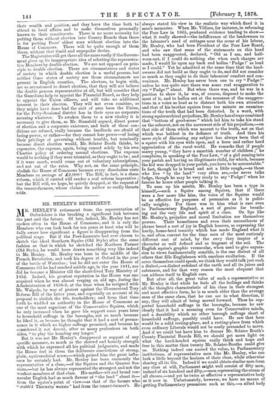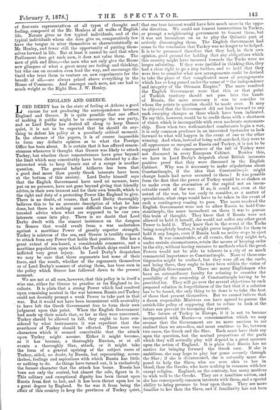MR. HENLEY'S RETIREMENT.
MR. HENLEY'S retirement from the representation of Oxfordshire is the breaking a significant link between the past and the future. Of late, indeed, Mr. Henley has not spoken often in the House of Commons, and it is only the Members who can look back for ten years at least who will be fully aware how significant a figure is disappearing from the political stage. But if the Poet-Laureate had ever chosen to sketch the ideal Southern Squire (Old Style) after the same fashion as that in which he sketched the Northern Farmer (Old Style), he would have drawn something very like indeed to Mr. Henley. Mr. Henley was born in the middle of the French Revolution, and took his degree at Oxford in the year of the battle of Waterloo ; but he did not enter the House of Commons till he had reached middle age, in the year 1841, nor did he become a Minister till the short-lived Tory Ministry of 1852. Indeed, his greatest reputation in the House was one acquired when he was almost verging on old age, during the Administration of 1858-9, at the time when he resigned with Mr. Walpole, by way of protest against the ill-conceived Tory Reform Bill of the latter year, and especially on account of its proposal to abolish the 40s. freeholders ; and from that time forth he wielded an authority in the House of Commons as one of the most sagacious of the Conservative Squires, which he only increased when he gave his support some years later to household suffrage in the boroughs, not so much because he liked it, as because he thought that it had a sort of perma- nence in it which no higher suffrage promised, and because he considered it not decent, after so many professions on both sides, "to play the humbug any longer."
But it was not Mr. Henley's disapproval or support of any specific measure, so much as the shrewd and homely strength with which he expressed all his political judgments, and made the House feel in them the deliberate convictions of strong, plain, squirearehical sense,—which gained him the great influ- ence he certainly had. Mr. Henley has been eminently the representative of a class,—of the Squires and the Quarter Ses- sions,—but he has always represented the strongest and not the weakest members of that class. His mother-wit and broad ver- nacular English had as much flavour of "the land" about it— from the squire's point of view—as that of the farmer who " atubb'd Thoniab-y waiiste " had from the tenant-farmer's. He always stated his view in the realistic way which fixed it in men's memories. When Mr. Villiers, for instance, in reforming the Poor Law in 1865, produced evidence tending to show— what it really showed—the indifference of the landowners to the labourer's need of cottages near the scene of his labour, Mr. Henley, who had been President of the Poor Law Board, and who saw that some of the statements on this head had been exaggerated, declared, "Old as I am, and half- worn-out, if I could do nothing else when such charges are made, I would lie upon my back and holloa 'Fudge!' as loud as I could." Yet he admitted at the same time that the land- owners did not build as they ought to do, and did not consider as much as they ought to do their labourers' comfort and con- venience. Mr. Henley has never been one to cry "Fudge !" unless he was quite sure there was some real exaggeration to cry " Fudge !" about. But when there was, and he was in a position to show it, he was, of course, disposed to make the most of it, and to holloa out at the nonsense of the exaggera- tions in a voice so loud as to distract both his own attention and that of his brother squires from too minute an examina- tions of the truth that had been distorted. In a word, with strong squirearchical prejudices, Mr. Henleyhas always combined that "bottom of good-sense" which led him to take his stand on the soberest, not on the narrowest side of his prejudices,—on that side of them which was nearest to the truth, not on that which was boldest in its defiance of truth. And then his mere style of discussing any subject has always been that of a squire with his eyes wide open, and a keen and rather hard appreciation of the rural world. He remarks that if people marry young, "they have a smartish number of children ;" he complains, in speaking of the Poor Law, "of a girl coming into your parish and having an illegitimate child, for which, because the kid was dropped in your parish, you have to be accountable." In fact, though he is broad and not a little rough,—as those who live "by the land" very often are,—he never talks fudge, though he may be very ready to say 'Fudge!' when he fancies he hears other people talking it.
To sum up his merits, Mr. Henley has been a type in himself,—such a Squire among Squires, that if there were a few more like him, the voice of the Squires would be as effective for purposes of persuasion as it is politi- cally weighty. For there was in him what is rare even in Parliamentary England, a sort of genius for breath- ing out the very life and spirit of a class. On lips like Mr. Henley's, prejudice and moral limitation are themselves powers. Their homeliness and even their uncouthness of phrase breed a sort of joy in English hearers, as expressing the hardy, home-bred tenacity which has made England what it is, and often convert for the time men of the most curiously different cast of mind, by the envy they inspire of a character so well defined and so fragrant of the soil. The English squire's graphic vernacular, when used to give expres- sion to views fundamentally sensible, is the one dialect of all others that fills Englishmen with emulous exultation. If the acres themselves could speak, we think they would talk just such a dialect,—a dialect redolent of the earth and all its juices and substance, and for that very reason the most eloquent that can address itself to English ears.
But after all, the great value of such a representative as Mr. Henley is that while he feels all the feelings and thinks all the thoughts characteristic of his class in their strongest and most effective form, he is so much abler than the average man of the same class, that he can see in what direction, if any, they will admit of being moved forward. Thus he sup- ported household suffrage in the boroughs, because he saw clearly that it had a meaning even for Conservative minds, and a durability which no other borough suffrage short of household suffrage, possibly could have. He saw that here would be a solid resting-place, and a resting-place from which even ordinary Liberals would not be easily persuaded to move. And if we could but have him to discuss Mr. Sclater Booth's County Financial Boards Bill, we should get more light on what the hard-headed squires really think and hope and fear in this matter than twenty Mr. Sclater-Booths could give us. Nothing indeed can exceed the value, to Parliamentary institutions, of representative men like Mr. Henley, who can look a little beyond the horizon of their class, while otherwise sharing all its life. Indeed if we could obtain similar men from any class at will, Parliament might well consist of fifty men, instead of six hundred and fifty,—men representing the cream of all classes,—and yet be twice as effective a representative body as it now is. Unfortunately, however, we have no means of getting Parliamentary pemmican such as this,—a sifted body of first-rate representatives of all types of thought and that our true interest would have lain much more in the oppo- feeling composed of the Mr. Henleys of all walks of English site direction. We could not foment insurrections in Turkey, life. Nature gives us few typical individuals, and of the or prompt a neighbouring government to foment them, but typical individuals whom she does give us, comparatively few it was not incumbent on us to play the Quixotic part of have the tongue to utter themselves so characteristically as actively discouraging them. The English Government had Mr. Henley, and fewer still the opportunity of putting them- come to the conclusion that Turkey was no longer to be helped. selves forward in life. But at least it cannot be said that when It is to be presumed therefore that they had, in their own Parliament does get such men, it does not value them. The opinion, good ground for holding that any obligations which men of pith and fibre,—the men who not only give the House this country might have incurred towards the Turks were no new glimpses of what a great many are feeling and thinking, longer subsisting. If they were justified in thinking this, they but who can on occasion even lead the way, and encourage the had a clear light to go a step further, and to hold that they timid who trust them to venture on new experiments for the were free to consider what new arrangements could be devised benefit of all,—are always prized above everything in the to take the place of that complicated mass of arrangements House of Commons. And amongst such men, not one had so which has so long passed under the name of " the independence much weight as the Right Hon. J. W. Henley. and integrity of the Ottoman Empire." The more resolved



































 Previous page
Previous page